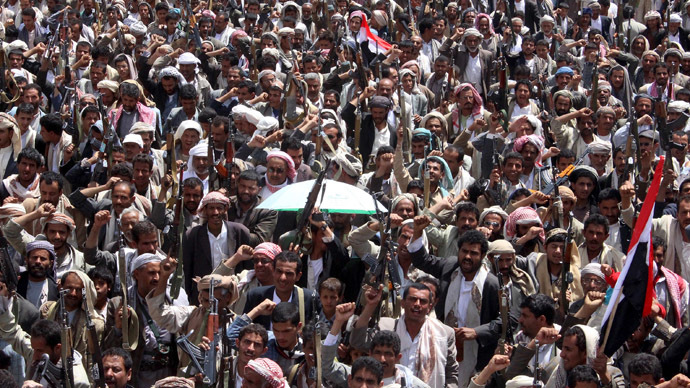Iran, Russia demand immediate halt to Saudi-led intervention in Yemen
Iran and Russia have called on Saudi Arabia to halt airstrikes on Yemen as supporters of Yemen’s ruling Houthi militants stage demonstrations throughout the country, protesting against the Saudi-led military intervention.
Speaking to Iranian President Hassan Rouhani, Russia’s Vladimir Putin called for an "immediate cessation of military activities" in Yemen and increased efforts to find a peaceful solution to the crisis, the Kremlin said in a statement on Thursday.
Iranian Foreign Minister Mohammad Javad Zarif said that military operations against Yemen will only lead to further destabilization of the region, which has fallen under Houthi control after an onslaught of increased violence in recent months.
READ MORE:Oil surges 6% after Saudi launches military airstrikes in Yemen
“We demand an immediate stop to the Saudi military operations in Yemen,” he said in an interview with Iran's Arabic-language al-Alam news network on Thursday. “We will spare no effort to contain the crisis in Yemen.”
Iran is suspected of providing supplies and training to the Houthi rebels, but Tehran has publicly denied these claims.
A United Arab Emirates official, however, expressed concerns about Iran's influence in Yemen.
"The strategic change in the region benefits Iran and we cannot be silent about the fact that the Houthis carry their banner," UAE Minister of State for Foreign Affairs Anwar Mohammed Gargash tweeted on Thursday.
Lebanon’s Hezbollah has decried Saudi intervention as “unjust aggression.” The Shiite group urged Saudi Arabia and its allies to cease the strikes immediately.
"This adventure, [which] lacks wisdom and legal and legitimate justification and which is led by Saudi Arabia, is taking the region towards increased tension and dangers for the future and the present of the region," the group said in a statement.

Saudi-led strikes, launched early Thursday morning, targeted the country’s capital Sanaa as well as a southern base. Following the strikes, a Houthi revolutionary committee called for mass rallies to stir up public support for a military response to the Saudi intervention.
“We will react against Saudi oppression in all ways we are capable...Yemeni blood is not cheap. Saudi has announced war in Yemen,” said Ali Al Kohom, a member of the Houthi Political Council.
Houthi leadership has also maintained that the country is ready to ward of Saudi aggression without help from Tehran.
“Yemeni people are prepared to face this aggression without any foreign interference," Houthi politburo official Mohammed al-Bukhaiti told Reuters.
Meanwhile, EU foreign policy chief Federica Mogherini has said that a military response will not solve the crisis in Yemen, and urged all parties to act “responsibly.”
READ MORE: Libya, Syria, Yemen: Sectarian conflict threatens entire Middle East
“I’m convinced that military action is not a solution,” she said. “At this critical juncture, all regional actors should act responsibly and constructively to create as a matter of urgency the conditions for a return to negotiations.”
International intervention in Yemen is likely to result in “the rise of sectarian strife and prolonged civil unrest,” political analyst Ibrahim Alloush told RT. Casting doubt on the possibility of a ground invasion in Yemen, Alloush said that such a move would end in a “war of attrition” because of Yemen’s geographic and demographic "complexities."
He also noted that Saudi Arabia’s own stability is at stake because the airstrikes target those with connections back in the Gulf kingdom.
Though Washington is not involved directly in the operation, the White House has authorized “logistical and intelligence support.”
Yemen’s ousted President Abd Rabbuh Mansur Hadi left the country's southern city of Aden on Thursday, where he had been holing up since fleeing Houthi custody in February. Saudi state TV said he has arrived in the Saudi capital Riyadh and will later head to Egypt under Saudi protection, where he is expected to attend an Arab summit on Saturday.
An escalating conflict in Yemen could bode badly for global oil supplies, as oil prices spiked more than four percent on Thursday.












